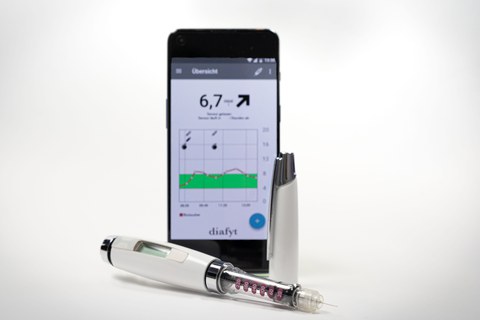Feb 14, 2022
Smart sensors and self-learning AI software: Treating diabetes more safely with digital technology
Avoiding therapy errors with the help of digital technology is the goal of the research cooperation between the TU Dresden and the Leipzig-based start-up diafyt MedTech. Their solution for digital diabetes management combines the use of self-learning AI software from diafyt MedTech with high-tech insulin pens developed at TU Dresden and novel semiconductor sensors for blood glucose measurement.
The digital diabetes therapy of the Saxon research duo has now been honored with the bytes4diabetes Award of BERLIN-CHEMIE AG. The prize is awarded for innovative digital projects related to diabetes therapy. For the Novartis AG Digital Health Award, the collaboration partners are among the seven finalists and are receiving increasing recognition in industry circles for their technology.
Type 1 diabetes is a form of diabetes in which the pancreas does not produce enough or any insulin at all. Those affected therefore have to inject themselves regularly with insulin to regulate their blood glucose levels. Finding the right dose is a major challenge. Conventional solutions require sufferers to calculate their insulin requirements themselves. Application errors with the digital smartpens currently available on the market can lead to incorrect doses and severe fluctuations in glucose metabolism. The result is hyperglycemia or hypoglycemia, which not only impairs patients' quality of life, but can even damage organs in the long term.
The digital diabetes therapy of the Saxon research partners makes it possible to identify the individual insulin requirement of the person. To this end, diafyt MedTech has developed an algorithm that calculates the optimal insulin dose for type 1 diabetics and integrates it into a smartphone app. The algorithm observes the individual's metabolism and, thanks to self-learning artificial intelligence, calculates the appropriate need for insulin. The insulin pens developed at TU Dresden enable convenient and precise injection. They transmit the data and insulin quantities to the app via Bluetooth. There they are further processed and stored. Thanks to artificial intelligence, the suggestions for the required insulin dose become more individualized over time. This reduces the risk of hyperglycemia and hypoglycemia. Another advantage for patients: The smartpen uses additional sensors to detect application errors and provides assistance to correct them. This makes everyday life easier for those affected and can improve their life expectancy in the long term.
Information for journalists:
Dr. René Richter
Faculty of Electrical and Computer Engineering
Phone: +49 351 463-36329
rene.richter@tu-dresden.de

